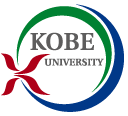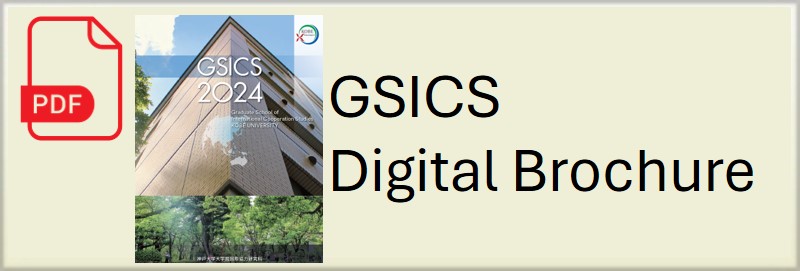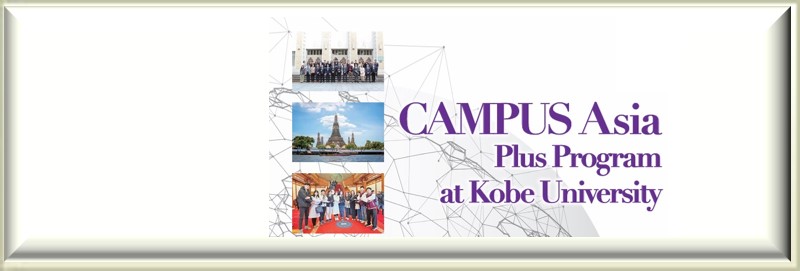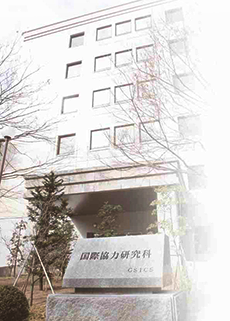Overview of GSICS
Aims and Objectives
The Graduate School of International Cooperation Studies (GSICS) aims to prepare talented young people to work in international fields and, through their work, to make a contribution to the international community. At GSICS we believe that mutual understanding and respect for human rights is essential for peaceful global co-existence, and thus strive in our education, research and community activities to further this goal. In particular, we endeavor to provide students with the multidisciplinary background and expertise that will help them both as researchers and practitioners in the field of international cooperation.
Distinctive Features
- Our world is confronted with a range of transnational issues such as the emergence of a borderless economy, poverty, armed conflict, terrorism, global warming and the spread of infectious diseases. Conventional methods of international cooperation are not sufficient to address these problems, and new approaches are necessary. The GSICS curriculum reflects this concern. The multidisciplinary curriculum design enables students to acquire the knowledge and skills necessary to participate in the creation and development of these new approaches.
- GSICS has courses of study in both Japanese and English. International students are welcome. For those are not fluent in the Japanese language, GSICS offers courses taught in English at both the Master’s and Doctoral levels. International students comprise approximately forty percent of those enrolled in GSICS, and most of them are from developing countries.
- The course of study in Japanese is comprised of four programs: International Studies, Development and Economics, International Law/Law and Development, and Politics and Area Studies. The curriculum in each Program is designed to offer opportunities for systematic study, and each offers degrees in their respective fields.
- GSICS offers a flexible curriculum where students can acquire a wide range of knowledge. In addition to its own faculty, GSICS receives support from eight Kobe University graduate schools and institutes including the Graduate Schools of Economics, Law, Medicine, Health Sciences, Engineering, the Research Institute for Economics and Business Administration, the Institute for the Promotion of Higher Education and the Research Center for Urban Safety and Security. Thanks to their assistance, GSICS can provide multi-dimensional education and research supervision.
- While some students opt to follow scholarly careers, many students become practitioners. In pursuing their studies, students are encouraged to take a practical and applied approach to international issues. At the same time, they are expected to master basic methodologies for fundamental, theoretical, and empirical studies. We believe that this approach to education helps students build their capacity to address an increasingly diverse, complex, and changing world.
- The faculty of GSICS includes experts in international cooperation from Japan and other countries, serving as full-time and visiting professors, as well as adjunct lecturers.
- In addition to recent university graduates, GSICS welcomes applicants with various international, working, academic and other experiences. GSICS aims at training competent professionals and academics, able to work in all the different areas of international cooperation.
- GSICS helps its students to find employment. Recruitment seminars are regularly held at GSICS by international organizations including the World Bank, IMF and WFP. Job guidance, seminars and information sharing are provided.
- In celebration of its 50th anniversary, the Kobe University Rokkodai Foundation created the 'Ryoso Award' with the purpose of contributing to the further development of work in the social sciences. It is given annually to selected students in order to facilitate oversea study.
Various Activities Linking GSICS with the World
In addition to its educational and research activities, GSICS is involved in a wide variety of programs, some of which are introduced below.
International Conferences and Symposia
Seeking to enhance our education and research and to further international exchange, GSICS frequently convenes international conferences and symposia in which the active participation of students is encouraged. GSICS also invites leading specialists working in international fields to deliver lectures at policy and research seminars and other events.
International and Cooperative Relationships
GSICS has signed cooperative agreements with many overseas universities (40 institutions in 20 countries), Japanese universities and international agencies within and outside of Japan. Students not only have opportunities to engage in internships or study abroad, but also to obtain double degrees or participate in overseas training. In many cases, students can receive credit for work at other institutions.
CAMPUS Asia Plus Program Multidisciplinary Education Program for Careers on Risk Management Experts

This is a high-quality joint educational program to foster "risk management specialists" by five universities, with Kobe University, Fudan University, and Korea University serving as the core, and Chulalongkorn University and National University of Laos joining us. The program aims to foster highly specialized, practical and applied global risk management professionals and leaders in the fields of politics, economics, management, international relations and security, public policy, human resources, disaster prevention, and international health (including infectious diseases). The program also develops analytical and applied skills based on specialized knowledge, language skills (English + α), problem-solving skills, policy proposal skills, and presentation skills required by international organizations, government institutions and agencies, public offices, global companies, health/medical-related companies, international/domestic NGOs, etc.
Indonesian Linkage Program
In 2007, students who had completed one year of study at one of three Indonesian universities were admitted to GSICS. These Indonesian Linkage Program (ILP) students, after fulfilling the requirements for both universities, will obtain degrees from both institutions within two years. The ILP provided the impetus for developing the GSICS Double Degree Program.
Past Programs
Core-to-Core Program (Asia-Africa Science Platforms)
GSICS has implemented the project on "Study on Education Finance and Administration in Asia and Africa: A Sustainable Program to Nurture Young Researchers" with the researchers in East Asia, Southeast Asia, Middle East and East Africa.
Young Leader's Program (YLP) Local Government Course
From 2003 to 2008, GSICS hosted the Young Leader's Program (YLP) Local Government Course for promising young government professionals from designated participating countries. Many professionals took advantage of this course.
Laos Project

For seven years, GSICS assisted in the establishment and management of the Faculty of Economics and Business Management (FEBM) at the National University of Laos.
Yemen Girls Education Project
From 2005 to 2012, GSICS has participated in a joint venture with a development consultant firm and implemented a girls’ education project known as BRIDGE project aimed to increase girls’ enrollment and improve the quality of education. The BRIDGE Project was introduced in the Japanese ODA Education Cooperation Strategy as "Best Practices".
Asia-Africa Universities Dialogue (PhaseIV)
GSICS has also participated in the Asia-Africa Universities Dialogue, which is recognized by UNESCO’s University Twinning and Networking (UNITWIN). This Dialogue has been recognized as a good project in the 'Japanese ODA Education Cooperation Strategy'.







